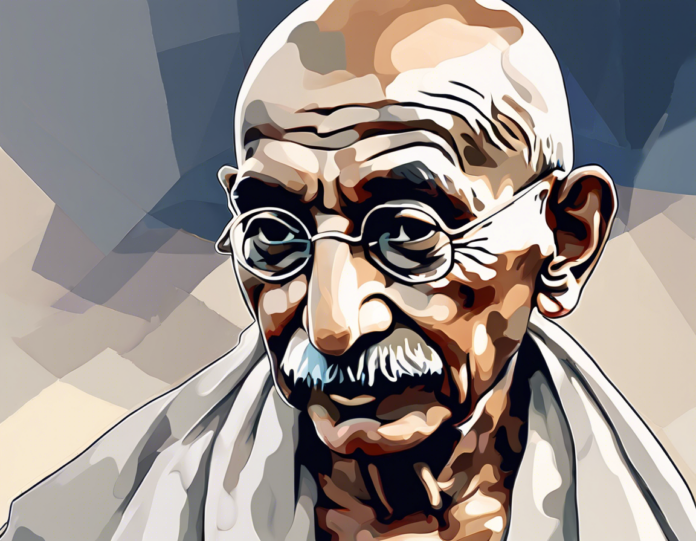As one of the most iconic and influential figures in the history of the world, Mahatma Gandhi’s legacy continues to resonate strongly in modern times. His philosophy of nonviolent resistance and civil disobedience not only played a pivotal role in India’s independence movement but also inspired a multitude of other movements and leaders across the globe.
Mahatma Gandhi’s Early Life and Influence
Born on October 2, 1869, in Porbandar, India, Gandhi Ji was influenced by his devout Hindu upbringing, which instilled in him values of ahimsa (nonviolence), satya (truth), and sarvodaya (welfare for all). After studying law in London, he went to South Africa where he faced racial discrimination. It was in South Africa that he developed his concept of Satyagraha, a form of nonviolent resistance that he would later employ in India’s struggle for independence.
The Salt March and India’s Independence
One of the most iconic moments in Gandhi Ji’s fight for India’s independence was the Salt March in 1930. In response to the British salt monopoly, Gandhi led a 240-mile march to the Arabian Sea to make salt from seawater, defying the British salt tax. This act of nonviolent civil disobedience galvanized the nation and drew international attention to the cause of Indian independence.
Gandhi Ji’s Philosophy in Modern Context
Nonviolent Resistance in the 21st Century
In today’s world, where conflicts are often resolved through violence and aggression, Gandhi Ji’s principles of nonviolent resistance are more relevant than ever. Movements like the Civil Rights Movement in the United States, led by Martin Luther King Jr., and the struggle against apartheid in South Africa, led by Nelson Mandela, drew inspiration from Gandhi Ji’s methods.
Environmentalism and Sustainability
Gandhi Ji’s emphasis on living in harmony with nature and his advocacy for simple living and self-sufficiency can be seen as precursors to the modern environmental movement. Concepts like minimalism, sustainable living, and ethical consumption resonate with his teachings on respecting the earth and all its inhabitants.
Social Justice and Equality
The fight against oppression, discrimination, and inequality continues to be a pressing issue in the modern world. Gandhi Ji’s emphasis on social justice, equality, and universal brotherhood serves as a guiding light for movements advocating for the rights of marginalized communities, including LGBTQ rights, gender equality, and racial justice.
Gandhi Ji’s Influence on Global Leaders
Martin Luther King Jr.
Martin Luther King Jr., a prominent leader in the American Civil Rights Movement, was deeply inspired by Gandhi Ji’s philosophy of nonviolence. King traveled to India in 1959 and met with individuals who had been close associates of Gandhi Ji, further solidifying his commitment to nonviolent protest as a means of social change.
Nelson Mandela
Nelson Mandela, the anti-apartheid revolutionary and former President of South Africa, credited Gandhi Ji as one of his main influences. Mandela’s fight against racial segregation and discrimination was largely inspired by Gandhi Ji’s success in using nonviolent resistance to bring about political change.
Aung San Suu Kyi
Aung San Suu Kyi, the Burmese politician and Nobel Peace Prize laureate, has cited Gandhi Ji as one of her greatest influences. Suu Kyi’s peaceful resistance against the military junta in Myanmar echoes Gandhi Ji’s approach to nonviolent protest and civil disobedience.
Gandhi Ji’s Legacy in Today’s Political Landscape
Diplomacy and Conflict Resolution
Gandhi Ji’s emphasis on dialogue, mediation, and compromise as tools for resolving conflicts continues to be relevant in today’s political landscape. His approach to conflict resolution prioritized understanding, empathy, and mutual respect, principles that are vital for fostering peace and cooperation in international relations.
Human Rights and Dignity
The Universal Declaration of Human Rights adopted by the United Nations draws heavily on principles of dignity, equality, and justice espoused by Gandhi Ji. His unwavering commitment to upholding the rights and dignity of all individuals resonates with the global struggle for human rights and social justice.
Interfaith Harmony and Tolerance
Gandhi Ji’s vision of religious pluralism and interfaith harmony serves as a beacon of hope in a world rife with religious conflicts and intolerance. His belief in the essential unity of all faiths and his commitment to respecting and learning from diverse religious traditions are essential principles for promoting peace and understanding among different communities.
Frequently Asked Questions (FAQs)
1. What is the meaning of Satyagraha?
Satyagraha is a term coined by Gandhi Ji, combining the Sanskrit words “satya” (truth) and “agraha” (insistence or holding firmly to). It refers to the philosophy of nonviolent resistance and civil disobedience as a means of achieving political and social change.
2. How did Gandhi Ji’s upbringing influence his philosophy?
Gandhi Ji was deeply influenced by his devout Hindu upbringing, which instilled in him values of ahimsa (nonviolence), satya (truth), and sarvodaya (welfare for all). These values formed the foundation of his philosophy of nonviolent resistance.
3. What was the significance of the Salt March?
The Salt March, led by Gandhi Ji in 1930, was a symbolic act of civil disobedience against the British salt monopoly in India. By making salt from seawater in defiance of the salt tax, Gandhi Ji galvanized the Indian independence movement and drew international attention to the cause.
4. How did Gandhi Ji’s philosophy influence global leaders?
Leaders like Martin Luther King Jr., Nelson Mandela, and Aung San Suu Kyi drew inspiration from Gandhi Ji’s philosophy of nonviolent resistance in their own struggles for civil rights, equality, and democracy.
5. What is the relevance of Gandhi Ji’s teachings in today’s world?
Gandhi Ji’s emphasis on nonviolent resistance, social justice, sustainability, and interfaith harmony continues to inspire movements and individuals advocating for peace, justice, and equality in the modern world.
In conclusion, Mahatma Gandhi’s legacy endures as a guiding light for those fighting against injustice, inequality, and oppression. His teachings on nonviolence, truth, and compassion offer timeless wisdom that transcends borders and cultures, inspiring generations to strive for a more just, peaceful, and harmonious world.
